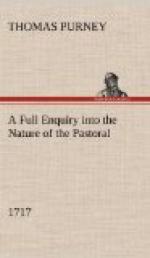If all the Incidents or Actions, that are truly simple and delightful, thro’ the whole Number of Theocritus’s Idylls, were collected into one Pastoral, so as to follow naturally each other, and work up to one general End, I think that Pastoral would be more truly simple than any we have at present. ’Tis true, a Poet may thrust into Pastoral as great a multitude of Actions, and as surprizingly brought about, as we find in Tragedy, but there is no necessity, because he must use a Number sufficient to please, that therefore he must fall into that fault. Yet for mine own part, I had rather see too much, than too little Action, as I cannot help preferring a faulty Writer before a dull One.
But a Poet of Genius will diversify and adorn his Fable, as much as he lawfully may; and as for the Simple, he will draw such soft and tender Characters, as will furnish his Poem with enough of that, and of the most delightful Kind. The generality of Pastoral Writers seem to think they must make their Pieces simple, by divesting them of all the Ornaments of Poetry; and the less and more inconsiderable Sketches they are, the more Simple they are. A strange Conception sure of Simplicity. While their Sentiments are false almost in every Line; either in their own Nature; or with respect to Pastoral; or to the Person speaking; or some other foreign Cause. But I shall always wave the being particular in such Cases as these. To point at Faults directly, I think the Business of a Carper, not a Critick.
CHAP. IV.
Of the Moral; and what kind of Moral Pastoral require’s.
The fourth Quality that a Fable ask’s, to render it compleat, is a Moral Result. I need not trouble you with a Proof of a Moral’s being necessary; ’tis plain that every Poem should be made as perfect as ’tis capable of being, and no one will ever affirm a Moral to be unnatural in Pastoral. But if any one should demand a Proof, ’tis thus: Poetry aim’s at two Ends, Pleasure and Profit; but Pastoral will not admit of direct Instructions; therefore it must contain a Moral, or lose one End, which is Profit. We might as easy show that the other End of Poetry, viz. Pleasure, is also impair’d, if the Moral be neglected; but the thing is plain.
To hasten therefore to enquire what kind of Moral is proper for Pastoral, we must look back into the Reasons prescribed by Nature for the Morals in all Sorts of Poetry.
Epick Poetry and Tragedy are conversant about Hero’s, Kings, and Princes, therefore the Morals there, should be directed to Persons engaged in Affairs of State, and at the Helm, and be of such a Nature as these; A Crown will not render a Person Happy, if he does not pursue his Duty towards God and Man; the best Method of Securing a Government, is to occasion Unity in it, and the like.
Again, Comedy’s Subject is to expose the Ill Habits in low Life. It’s moral therefore should contain Instructions to the middle Sort of People: As, What Ills attend on Covetousness. Or, On a Parent’s being too Severe, or the like.




